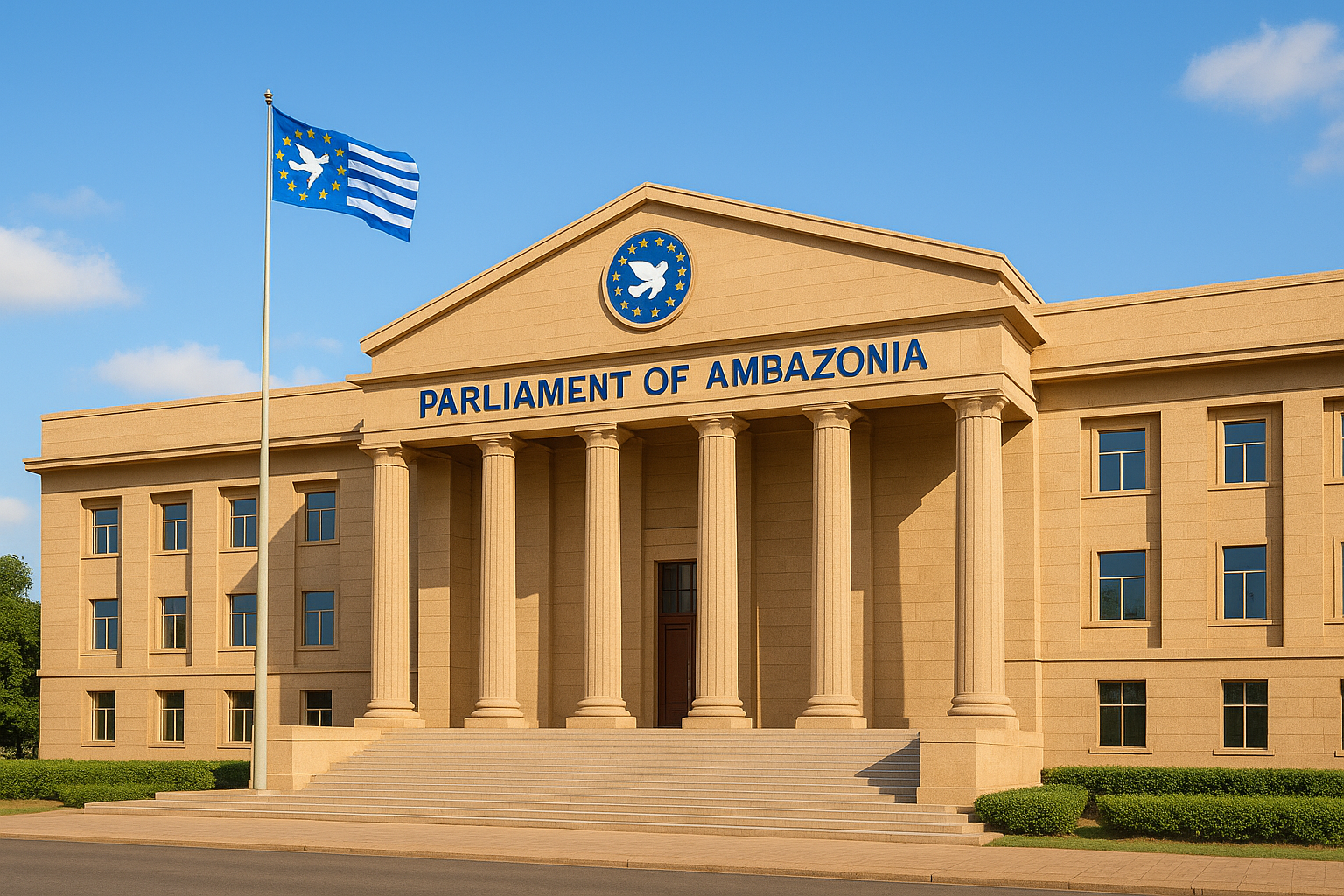The Parliament
Overview
The Parliament of Ambazonia stands as the legislative heart of the Republic, an institution entrusted with the sacred duty of upholding democracy, safeguarding national sovereignty, and ensuring that governance is anchored in the will of the people. It is the chamber where laws are made, debates are conducted, and national policies are scrutinized to reflect the aspirations of Ambazonians. Rooted in history and nourished by the sacrifices of forebearers, the Parliament serves as both a guardian of liberty and a builder of national identity.
The Ambazonian people, having endured decades of marginalization, oppression, and systemic injustice, view Parliament not simply as a political body, but as a symbol of their right to self-determination. Through its establishment, the Republic proclaims that sovereignty belongs to the people, and that governance must be accountable, transparent, and grounded in the pursuit of justice.
.
The Role of Parliament
The Parliament of Ambazonia is charged with enacting laws that shape the social, political, and economic fabric of the Republic. Its legislative role extends beyond lawmaking; it includes ensuring checks and balances within government, providing oversight to the executive branch, and protecting the fundamental rights of citizens. Parliament is where the collective voice of the people is amplified, ensuring that no community, group, or individual is excluded from the national conversation. By exercising these responsibilities, Parliament functions as:
1. The Guardian of Democracy – Ensuring free expression, fair representation, and just governance.
2. The Custodian of National Sovereignty – Resisting all external domination and affirming Ambazonia’s independence.
3. The Defender of Justice and Human Rights – Promoting equality, protecting liberties, and safeguarding the dignity of every citizen. The Engine of National Development – legislating policies that drive education, health, infrastructure, and economic growth .

Representation of the People
The Parliament is fundamentally a people’s institution. Each Member of Parliament (MP) serves as a representative of a constituency, carrying the voices, struggles, and aspirations of the people into the legislative chamber. The diversity of Ambazonia—its ethnic groups, cultural traditions, and social classes—finds expression in Parliament. Representation is not only a matter of numbers but of inclusivity. Parliament recognizes the role of marginalized voices—women, youth, refugees, and minority groups—and seeks to guarantee them space in the national discourse. By doing so, it fosters unity in diversity and ensures that governance reflects the richness of Ambazonian society.
Upholding Sovereignty
Sovereignty lies at the core of the Parliament’s mission. Having proclaimed independence in defiance of foreign domination and systemic marginalization, the Ambazonian people rely on Parliament to protect and assert their right to self-rule. Parliament thus serves as the institutional guardian of independence, crafting laws that strengthen the Republic’s foundations and affirming Ambazonia’s rightful place among nations. Sovereignty is not merely a legal concept but a lived reality expressed through self-governance. By enacting laws, shaping policy, and scrutinizing government actions, Parliament ensures that sovereignty is preserved both symbolically and practically.
Democratic Foundations
Parliament embodies the democratic values for which Ambazonians have long struggled. Its work is grounded in: • Participation – giving citizens a direct and indirect role in governance. • Accountability – holding leaders answerable for their actions. • Transparency – ensuring laws, debates, and decisions are accessible to all. • Justice – protecting rights and upholding the rule of law. These foundations remind both citizens and leaders that democracy is not a gift, but a duty sustained by vigilance, sacrifice, and integrity. .
Challenges and Responsibilities
The Parliament of Ambazonia, like any institution born of struggle, faces profound challenges. Among these are: • Political Pressures – managing competing factions and ensuring unity in the face of division. • External Hostility – defending sovereignty against attempts at foreign domination or interference. • Resource Constraints – functioning effectively despite limited finances and infrastructure. • Public Expectations – meeting the hopes of a population yearning for justice, development, and dignity. Yet within these challenges lie opportunities. Every debate, every law, and every session is an opportunity to strengthen the Republic, reassure the people, and build a more just and prosperous society. .

Structure of Parliament
Introduction
The Parliament is composed of two chambers: Lower House (House of Representatives / House of Commons) – directly represents the people and counties. Upper House (Senate / House of Elders) – provides wisdom, oversight, and long-term national vision.
Both chambers must approve laws, budgets, and policies before they can become binding.
This is the people’s chamber, designed to give every Ambazonian community and liberation faction a voice.
Composition:
County-Elected MPs (from the 13 counties: Bui, Donga-Mantung, Menchum, Boyo, Mezam, Momo, Ngoketunjia, Lebialem, Manyu, Kupe-Muanenguba, Fako, Ndian, Meme).
Defense Groups’ Representatives (nominated by generals of liberation forces).
Political & Restoration Movements’ Representatives (from all active groups, home and abroad).
Refugee Representatives (delegates from refugee communities in Ghana and Nigeria).
Function:
Draft, debate, and pass bills.
Represent grassroots voices.
Initiate budgetary proposals.
Provide first-level oversight of government actions.
Upper House – Senate
This chamber provides stability, wisdom, and national oversight. It represents tradition, experience, and long-term vision rather than only numerical representation.
Composition:
Recipients of Parliamentary & National Honors (statesmen, patriots, and heroes recognized for outstanding service).
Traditional Authorities / Elders (custodians of Ambazonian culture and identity).
Special Advisory Council Members (experts in law, diplomacy, security, and finance).
Function:
Review and refine bills passed by the Lower House. Act as a balancing force against populism or rash legislation.
Ratify treaties, high-level national appointments, and constitutional amendments.
Provide moral and cultural guidance for national direction.
Both chambers together:
Pass Laws – Bills start in the Lower House and must be approved by the Senate before becoming law.
Approve Budgets – Lower House proposes, Senate refines and confirms.
Oversight – Joint committees hold government accountable.
Representation – Ensures that both the grassroots (counties, refugees, defense forces) and the elders & national heroes have seats at the table.
Leadership of Parliament
Speaker of the Lower House – Presides over the House of Representatives.
President of the Senate – Presides over the Upper House.
Joint Parliamentary Council – A coordinating body between the two chambers, led by the Speaker and Senate President, to resolve disputes and harmonize decisions.
Why Bicameralism for Ambazonia?
- To balance democratic representation (House of Representatives) with stability and wisdom (Senate).
- To give space for both active fighters of liberation and historic patriots/elders.
- To ensure laws reflect both the will of the people and the wisdom of the nation.
- To avoid centralization of power in one chamber and create checks and balances.
Symbolism and National Identity
The organization of Parliament is not only functional but symbolic. Its chamber, leadership roles, and procedures are designed to reflect Ambazonia’s sovereignty, resilience, and identity as a nation. Every role, from Speaker to Clerk, signifies the people’s determination to govern themselves in dignity and freedom.
Speaker of Parliament
At the head of the Parliament is the Speaker, who serves as the presiding officer and the custodian of parliamentary traditions. The Speaker is more than a moderator of debates; he or she is the guardian of the dignity of Parliament, ensuring that its proceedings are orderly, fair, and respectful of democratic norms. Key responsibilities of the Speaker include:
• Presiding over sessions and maintaining order during debates.
• Ensuring that parliamentary procedures are followed. • Representing Parliament in official functions at home and abroad.
• Acting as a neutral figure who protects the rights of both majority and minority members.
• Serving as a symbol of national unity through impartial leadership.
The Speaker’s authority is balanced by the responsibility to serve all members equally, regardless of their political affiliation. This impartiality ensures that Parliament remains a forum for free and fair debate.
Deputy Speakers
To support the Speaker, the Parliament appoints Deputy Speakers, who share in the responsibility of presiding over debates and ensuring continuity of leadership.
Deputy Speakers are often drawn from different political or regional backgrounds to reflect the inclusivity of Parliament.
Their role includes:
• Presiding over sittings in the absence of the Speaker. • Assisting in coordinating parliamentary committees.
• Supporting administrative and ceremonial functions.
The presence of Deputy Speakers guarantees stability, even in times of political uncertainty or during the Speaker’s absence.
Members of Parliament (MPs)
The strength of Parliament lies in its Members. Each MP serves as a direct representative of the Ambazonian people, carrying into the chamber the voices, concerns, and aspirations of their constituencies.
Roles of MPs include:
• Proposing and debating bills.
• Advocating for the needs of their communities
• Holding the executive accountable through questions, motions, and oversight mechanisms.
• Participating in committees to examine legislation in detail.
• Engaging citizens and civil society to ensure that governance reflects the will of the people.
Parliamentary membership embodies the principle of inclusivity, with special emphasis on ensuring that women, youth, minorities, and marginalized groups have a voice in national governance.
The Clerk of Parliament
Behind the scenes, the Parliament functions effectively because of the work of the Clerk of Parliament and the parliamentary staff.
The Clerk serves as the chief administrative officer, responsible for the record-keeping, documentation, and coordination of parliamentary business.
Duties of the Clerk include:
• Recording and publishing parliamentary proceedings. •
• Advising the Speaker and MPs on rules and procedures..
• Managing administrative staff who support daily operations.
• Ensuring institutional memory by preserving archives and legislative records.
Without the Clerk and staff, Parliament would lack the organization necessary to conduct its constitutional responsibilities.
Committees of Parliament.
While Parliament conducts plenary sessions where all MPs debate, much of the detailed work occurs in committees. Committees allow for specialized review of legislation, policies, and government performance.
There are two main types:
1. Standing Committees – permanent committees focusing on finance, justice, foreign affairs, security, and other critical sectors.
2. Ad Hoc Committees – temporary committees formed to investigate specific issues, crises, or national concerns.
Committees enhance efficiency by dividing complex legislative tasks among smaller groups, ensuring thorough deliberation before matters are presented to the full chamber.
Sessions and Sittings
The Parliament’s structure is further defined by its schedule of sessions and sittings.
• Sessions are formal periods during which Parliament meets, often aligned with legislative calendars or national priorities.
• Sittings are individual meetings within a session, where specific debates, bills, or motions are addressed.
Regular sessions provide predictability and stability, while extraordinary sittings may be convened in response to national emergencies or urgent matters.
Inclusivity in Structure
The structure of the Parliament also reflects Ambazonia’s commitment to inclusivity and representation. Mechanisms are in place to ensure that:
• Women play a significant role in leadership and membership.
• Youth representation provides fresh perspectives on governance.
• Minority communities and marginalized groups have their voices amplified.
By weaving inclusivity into its very structure, Parliament strengthens national unity and ensures that democracy is not the privilege of a few but the right of all.